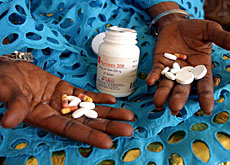
Swiss highlight effective HIV treatment

New HIV therapies are working in developing countries, but mortality rates are much higher than elsewhere. A Swiss study has discovered why.
The report by the department of Social and Preventive Medicine at Bern University is published in The Lancet medical journal on Saturday.
Highly active anti-retroviral therapy (HAART) – a combination of several anti-retroviral drugs – has reduced the mortality from HIV in developed countries by 90 per cent, but until now its rate of success was relatively unknown in developing countries.
“We know from studies that these treatments do reduce mortality considerably, but we were interested in whether they work equally well in Africa, Asia and Latin America,” Matthias Egger, from the department of Social and Preventive Medicine, told swissinfo.
Egger found that patients in developing countries are starting treatment when their HIV is much more advanced than in developed nations. As a result, their immune system has been much more been damaged.
“Mortality in the first few months was five to eight times higher in these treatment centres than in the North,” he said.
Consequences
It is hoped the two-year project will highlight how treatment can be introduced as quickly and as inclusively as possible and how its effectiveness can be maximised.
Egger thinks the study will have two major implications for the treatment programmes in developing countries.
“They have to try to get people into the treatment programmes earlier. Also, more attention must be given to concomitant complications like tuberculosis.”
He says doctors must deal with these side health problems before they start treating HIV – “and that’s only possible if they can diagnose people earlier on”.
Egger says another very important finding was that if people have to pay for drugs, the mortality rate will be almost double.
“In Africa people might start the treatment programmes because they’re desperate, but then they run out of money and interrupt their treatment. Then they disappear from the treatment programmes or die.”
He added: “It seems obvious, but it’s very important to actually show that it’s happening.”
Challenge
“The launching of these treatments has been quite staggering,” Egger said. “At least a million people are now being treated in the South. That’s still perhaps only 15 per cent of all people who need treatment, but it’s a significant change compared with two or three years ago.”
Despite this progress, Egger says the challenge is still formidable.
“After the enthusiastic move to support these treatment programmes by agencies including the World Health Organization and the Global Fund, all these initiatives really need to be made sustainable,” he said.
“It would be dreadful to see the West go in, pay for treatment for a few years, lose interest and then people start dying again – that would be a really bleak outlook and that has to be prevented.”
Is he confident the programmes will become sustainable?
“I’m hopeful,” he said.
swissinfo, Thomas Stephens
Overall trends in HIV transmission are still increasing.
There were five million new infections in 2005 globally.
More than 40 million people live with HIV globally.
Of the three million people who died of Aids-related illnesses last year, 500,000 were children.
A study by the department of Social and Preventive Medicine at Bern University has compared the mortality in HIV-infected patients between developed and developing countries.
Mortality in the first few months was found to be five to eight times higher in developing countries.
Also, if people have to pay for their drugs, the mortality rate will be almost double.

In compliance with the JTI standards
More: SWI swissinfo.ch certified by the Journalism Trust Initiative






























You can find an overview of ongoing debates with our journalists here . Please join us!
If you want to start a conversation about a topic raised in this article or want to report factual errors, email us at english@swissinfo.ch.